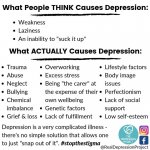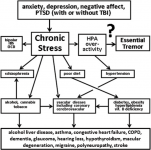David Baxter PhD
Late Founder
You Don't Look Like You Have Depression
By Brittany Kinsella in NAMI
Dec. 19, 2018
Every ninety days, I need a refill. I have to sit in the waiting room and check off whether or not I am sleeping or eating or feeling irritable. Every time I need a refill on my antidepressant, since I was nineteen years old, a receptionist has handed me this short questionnaire before I see the doctor.
It's usually pretty mundane. I give her my last name, she passes me the paper, and I quietly take a seat. I work through the standard questions on depression and hand it back to her. I play a game on my phone until the doctor calls me in. Until recently, this interaction has always been the same back and forth between us. But a few weeks ago, a receptionist I wasn’t as familiar with broke the script we usually follow.
Like always, I smiled when I approached the front desk, ever polite despite wanting to be elsewhere. I saw the questionnaire next to the receptionist, the section I was supposed to complete already highlighted. Upon hearing my last name, a confused look took over her face, and she eyed me up and down.
"Depression?" She asked, handing me the clipboard. "You don't look like you have that."
Taken off guard, I awkwardly laughed and found a seat in the waiting room. I checked off my answers honestly and felt my body heating up. Her comment bounced around in my mind; the blatant assumption was upsetting me, and I couldn't tell if I was overreacting. I wondered, Should I tell the doctor? Or should I brush it off as an ignorant choice of words?
After internally debating whether to mention it through the entire appointment, I ended up blurting it out to the doctor. She thanked me for telling her, and I felt better knowing that the next patient wouldn't have to hear something similar. I wish this receptionist had considered her words a more carefully. Why do I care? It’s really very simple: there is no face of mental illness.
No face of depression or anxiety. No face of schizophrenia or bipolar disorder. No specific look or standard that one can point out in a crowd of people. These illnesses come in every color and in every shape, at different times and through all ages. The receptionist was right. I don't "look" like I have depression because we are encouraged to carry on as best we can given the circumstances. I don’t have any outward signs of my condition but this doesn’t make it any less real. I also don't look like I have two brothers or the ability to wiggle my ears or an addiction to coffee, but I do. I don't look like I can play the flute, or was born in Florida, or have sleeping problems, but that's all true too.
I go to therapy. I take an antidepressant every day. Sometimes I don't eat for days at a time; instead I drink black coffee and red wine, and I cry. I struggle every day to get out of bed. I have tackled so much grief, emotional abuse and insecurity that it often doesn't feel worth it to wake up in the morning. But you wouldn’t be able to tell any of this just by looking at me.
To the receptionist at the doctor's office and anyone else who doesn't understand, let me tell you this: there are hilarious comedians and talented chefs and beautiful fashion designers who are taking their own lives. Someone like me might laugh a lot and wear nice clothes and pay her rent on time; it won't "look" like she's struggling to you, but it doesn't mean she's not.
There is no way to tell what someone is fighting other than engaging in simple conversation. Ask your best friend, your colleague or the stranger next to you how they are doing. Check up on those you are close to, because it's a scary world and some people want to leave. Life is not always beautiful, but sometimes it's extraordinary, and it's worth sticking around for. I know not everyone can be saved. But if we can save even one person, I still think we're doing the best we possibly can.
Brittany Kinsella is a writer in her mid-twenties, living and working in New York City. Her other work has been published on ThoughtCatalog. Brittany is a strong advocate for revealing the current stigma on mental health. Outside of writing, Brittany enjoys reading, running, cooking, and traveling to new places.
By Brittany Kinsella in NAMI
Dec. 19, 2018
Every ninety days, I need a refill. I have to sit in the waiting room and check off whether or not I am sleeping or eating or feeling irritable. Every time I need a refill on my antidepressant, since I was nineteen years old, a receptionist has handed me this short questionnaire before I see the doctor.
It's usually pretty mundane. I give her my last name, she passes me the paper, and I quietly take a seat. I work through the standard questions on depression and hand it back to her. I play a game on my phone until the doctor calls me in. Until recently, this interaction has always been the same back and forth between us. But a few weeks ago, a receptionist I wasn’t as familiar with broke the script we usually follow.
Like always, I smiled when I approached the front desk, ever polite despite wanting to be elsewhere. I saw the questionnaire next to the receptionist, the section I was supposed to complete already highlighted. Upon hearing my last name, a confused look took over her face, and she eyed me up and down.
"Depression?" She asked, handing me the clipboard. "You don't look like you have that."
Taken off guard, I awkwardly laughed and found a seat in the waiting room. I checked off my answers honestly and felt my body heating up. Her comment bounced around in my mind; the blatant assumption was upsetting me, and I couldn't tell if I was overreacting. I wondered, Should I tell the doctor? Or should I brush it off as an ignorant choice of words?
After internally debating whether to mention it through the entire appointment, I ended up blurting it out to the doctor. She thanked me for telling her, and I felt better knowing that the next patient wouldn't have to hear something similar. I wish this receptionist had considered her words a more carefully. Why do I care? It’s really very simple: there is no face of mental illness.
No face of depression or anxiety. No face of schizophrenia or bipolar disorder. No specific look or standard that one can point out in a crowd of people. These illnesses come in every color and in every shape, at different times and through all ages. The receptionist was right. I don't "look" like I have depression because we are encouraged to carry on as best we can given the circumstances. I don’t have any outward signs of my condition but this doesn’t make it any less real. I also don't look like I have two brothers or the ability to wiggle my ears or an addiction to coffee, but I do. I don't look like I can play the flute, or was born in Florida, or have sleeping problems, but that's all true too.
I go to therapy. I take an antidepressant every day. Sometimes I don't eat for days at a time; instead I drink black coffee and red wine, and I cry. I struggle every day to get out of bed. I have tackled so much grief, emotional abuse and insecurity that it often doesn't feel worth it to wake up in the morning. But you wouldn’t be able to tell any of this just by looking at me.
To the receptionist at the doctor's office and anyone else who doesn't understand, let me tell you this: there are hilarious comedians and talented chefs and beautiful fashion designers who are taking their own lives. Someone like me might laugh a lot and wear nice clothes and pay her rent on time; it won't "look" like she's struggling to you, but it doesn't mean she's not.
There is no way to tell what someone is fighting other than engaging in simple conversation. Ask your best friend, your colleague or the stranger next to you how they are doing. Check up on those you are close to, because it's a scary world and some people want to leave. Life is not always beautiful, but sometimes it's extraordinary, and it's worth sticking around for. I know not everyone can be saved. But if we can save even one person, I still think we're doing the best we possibly can.
Brittany Kinsella is a writer in her mid-twenties, living and working in New York City. Her other work has been published on ThoughtCatalog. Brittany is a strong advocate for revealing the current stigma on mental health. Outside of writing, Brittany enjoys reading, running, cooking, and traveling to new places.



